Overview
This article highlights the transformative impact of digital technologies in healthcare, showcasing how innovations such as electronic health records (EHRs), telemedicine, artificial intelligence (AI), and robotics are revolutionizing patient care and enhancing operational efficiency.
Through compelling case studies, it illustrates significant improvements in patient outcomes and operational effectiveness, emphasizing the urgent need for medical organizations to adapt to the rapidly evolving digital landscape.
As we navigate this transformation, one must ask: Are we ready to embrace these changes for a better healthcare future?
The evidence is clear—adopting these technologies is not just beneficial; it is essential for the advancement of the healthcare delivery system.
Introduction
In an era where technology is fundamentally reshaping healthcare, the urgency for digital transformation is at an all-time high. Electronic health records, telemedicine, and artificial intelligence are not just innovations; they are revolutionizing care delivery, improving patient outcomes, and optimizing operations.
As healthcare organizations confront the complexities of this transformation, they encounter both remarkable opportunities and significant challenges. With a market potential projected in the hundreds of billions, the stakes are monumental for those poised to leverage these advancements effectively.
This article examines the profound impact of digital technologies on healthcare, highlighting successful implementations, the advantages of embracing change, and the emerging trends that will shape the industry’s future.
Understanding Digital Transformation in Healthcare
Digital transformation in the medical field signifies the comprehensive integration of digital tools across all facets of the industry, fundamentally reshaping how organizations operate and deliver value to individuals. This transformation encompasses a wide array of technologies, including electronic health records (EHRs), telemedicine, artificial intelligence (AI), and advanced analytics. The main goal is to improve care for individuals, optimize operational effectiveness, and promote a more interconnected medical environment.
As medical frameworks grapple with rising demands for efficiency and quality, the importance of digital transformation becomes ever more evident. A recent survey indicated that 77% of U.S. respondents expect heightened regulatory focus on sustainability by 2025, underscoring the need for medical organizations to adapt swiftly to evolving standards and expectations.
Expert opinions highlight that investments in digital and analytics capabilities could unlock substantial benefits for health entities, positioning them to seize a market opportunity valued between $200 billion and $360 billion. This potential underscores the urgency for medical organizations to adopt digital transformation strategies that not only enhance outcomes for individuals but also improve operational capabilities.
Successful examples of digital transformation in healthcare demonstrate the tangible advantages of these initiatives. For instance, Medtronic’s acquisition of Mazor Robotics illustrates how incorporating advanced robotic technologies into surgical offerings can significantly enhance accuracy and patient results in minimally invasive procedures. Such case studies illustrate the effectiveness of digital technologies in enhancing operational improvements and providing value to patients.
Furthermore, Avato’s Hybrid Integration Platform plays a crucial role in this transformation by simplifying complex integration projects within the medical field. By maximizing and extending the value of legacy infrastructures, Avato addresses the challenges of integrating isolated legacy components and fragmented data, enhancing operational capabilities and lowering costs. The platform also offers real-time monitoring and alerts on system performance, ensuring that medical organizations can respond swiftly to any issues that arise.
This enables medical organizations to innovate without compromise, ensuring seamless and secure data connectivity across their operations.
In summary, the impact of digital technology on medical operations is profound, with organizations increasingly recognizing the necessity of adopting innovative solutions to remain competitive and responsive to client needs. As we approach 2025, the path of digital transformation in medical services will continue to progress, propelled by technological innovations and the necessity for improved care for individuals. Avato, born from a dedication to solving complex problems, stands ready to support this transformation with its commitment to delivering results for customers.
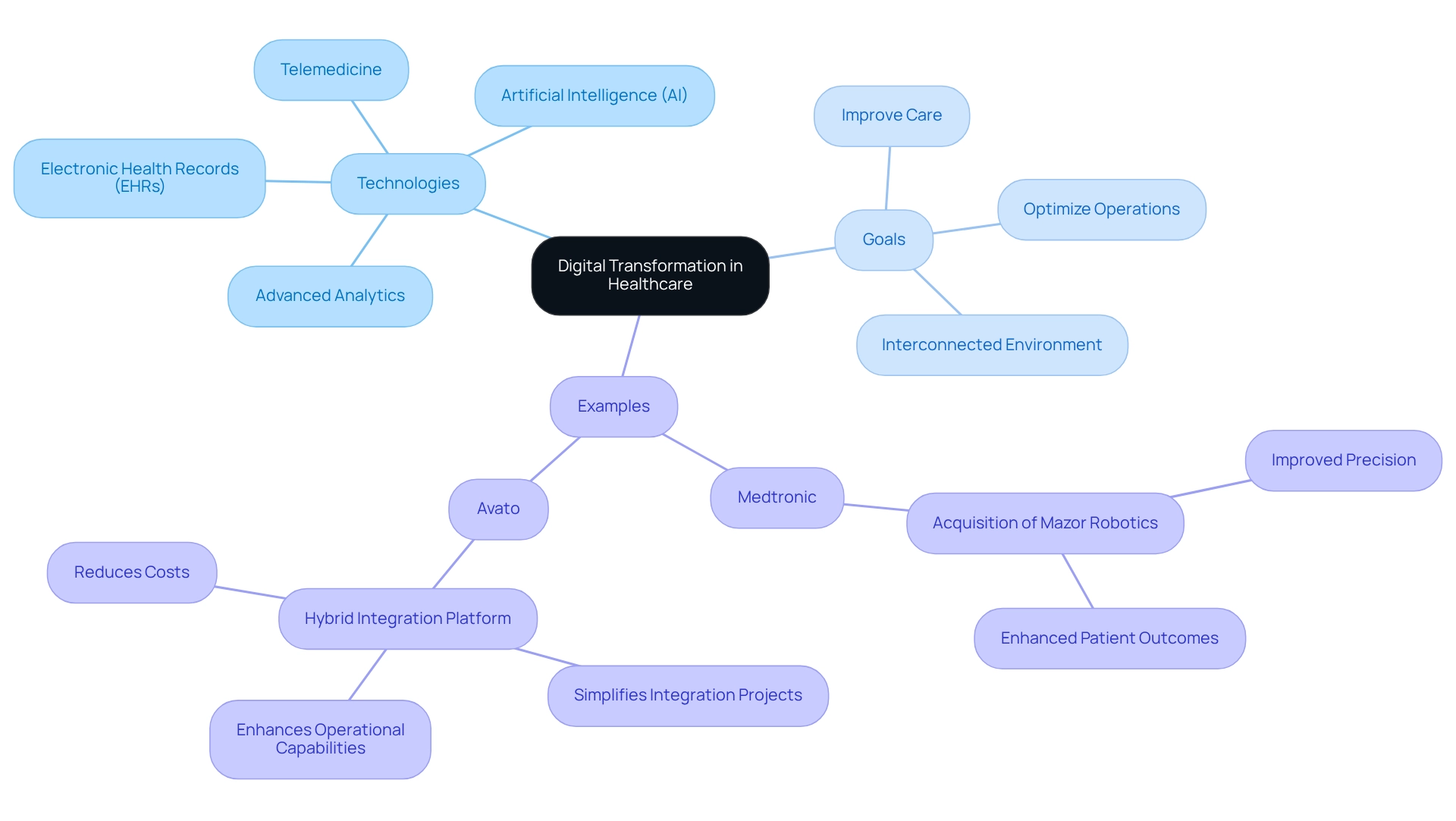
Electronic Health Records (EHRs): Revolutionizing Patient Data Management
Electronic Health Records (EHRs) have fundamentally transformed the management of individual information, revolutionizing how providers store, access, and share data. By digitizing medical records, EHRs facilitate rapid retrieval and updating of information—crucial for informed clinical decision-making. This transformation not only improves communication among medical teams but also significantly decreases errors associated with traditional paper records, thereby enhancing safety for individuals.
As of 2025, statistics indicate that EHR adoption rates have surged, with over 80% of providers utilizing these systems, reflecting a growing acknowledgment of their advantages. However, efficiency challenges persist; for example, a doctor must execute 6 clicks of the mouse to order an aspirin, 8 clicks for a chest x-ray, and 15 clicks to provide a prescription. EHRs not only optimize workflows but also enable advanced data analysis, empowering healthcare organizations to identify trends and enhance outcomes effectively.
A recent case study on EHR implementation in hospitals demonstrated a remarkable 30% reduction in medication errors, underscoring their vital role in enhancing safety for individuals.
Healthcare professionals have expressed their perspectives on the challenges of EHR implementation, noting that while the transition can be complex, the long-term benefits far outweigh the initial hurdles. Specialists emphasize that a well-organized EHR framework can enhance clinical decision-making, providing detailed health histories at the fingertips of providers. Furthermore, Avato’s reliable hybrid integration platform, developed from a commitment to addressing intricate challenges, plays an essential role in assisting medical organizations in adapting to evolving requirements, ensuring that EHR platforms progress alongside the industry’s needs while guaranteeing 24/7 uptime and security.
The latest advancements in EHR innovation in 2025 include improved interoperability features, enabling seamless data exchange across diverse medical networks. This capability is vital for coordinated care, particularly in managing chronic conditions where multiple providers are involved. As John Brownstein emphasizes, focusing on meaningful innovations rooted in actual enterprise-level objectives is crucial for optimizing the benefits of EHRs in individual care.
Moreover, the challenges of EMR implementation in India illustrate the complexities faced by medical organizations worldwide. Despite significant growth potential, uptake remains low compared to other countries, highlighting the need for strategic focus in EHR adoption. Overall, the transition to EHRs exemplifies digital transformation in healthcare, demonstrating how technology—especially through platforms like Avato’s—can significantly improve operational efficiency and the quality of care, paving the way for a more integrated and responsive system.
Avato’s secure integration capabilities ensure that transactions are managed with the highest reliability, further supporting the sector’s critical needs.
Telemedicine: Expanding Access to Healthcare Services
Telemedicine has fundamentally transformed healthcare delivery by enabling individuals to consult with healthcare providers remotely. This innovative technology has significantly expanded access to care, particularly for those in rural or underserved areas. Patients can now receive timely consultations without the burden of travel, which is especially advantageous for individuals with mobility challenges or chronic conditions.
Moreover, telemedicine promotes continuity of care, allowing individuals to easily follow up with their providers, thus improving overall health outcomes.
The COVID-19 outbreak served as a catalyst for the swift adoption of telemedicine, demonstrating its potential to enhance medical accessibility and efficiency. In 2025, statistics indicate that telemedicine usage has surged, with a notable increase in consultations across various demographics. For instance, a recent study revealed that telemedicine has improved access to services in rural areas by over 30%, illustrating its effectiveness in closing the care gap.
Successful implementations of telemedicine during the pandemic serve as prime examples of digital transformation in healthcare, highlighting its impactful role. Medical systems in rural areas adopted telemedicine solutions that not only maintained but also enhanced care during lockdowns. These initiatives have garnered commendation from medical leaders, who emphasize that telemedicine exemplifies digital transformation in healthcare, ensuring individuals receive prompt and efficient care regardless of their location.
Looking ahead, expert opinions suggest that telemedicine will continue to broaden access to medical services, particularly in rural areas where conventional medical assistance may be limited. Recent advancements in telemedicine access, including improved broadband initiatives and policy modifications, are poised to further strengthen its reach and effectiveness, ensuring that everyone can benefit from this revolutionary approach to delivering medical services.
Furthermore, the incorporation of digital healthcare, especially through AI and VR advancements, is set to enhance care for individuals even more. These technologies can bring a personal touch to medical care by offering individualized treatment choices and increasing patient engagement. For example, AI-driven solutions can assist medical providers in delivering personalized advice and support, while VR can create immersive experiences that help patients manage pain and anxiety during medical procedures.
However, as telemedicine continues to grow, the importance of compliance with regulations such as HIPAA cannot be overstated. The FTC’s recent actions in 2023, which included imposing financial penalties for breach notification failures, underscore the regulatory landscape surrounding telemedicine and its implications for medical providers. It is crucial for telemedicine systems to enhance security and compliance, particularly in light of the case study on securing supply chains against data breaches, which emphasizes the need for thorough due diligence rather than relying solely on good faith assurances.
Moreover, as Steve Alder, Editor-in-Chief, notes, “It is important to execute HIPAA-compliant Agreements with business associates because if an Agreement does not comply with the relevant standards it is invalid.” This underscores the necessity for medical providers to prioritize compliance in their telemedicine practices to maintain patient trust and data security. By leveraging reliable technology stacks, such as those offered by Avita, medical organizations can adapt to changing demands and ensure that their telemedicine solutions are effective and compliant, serving as models of digital transformation in healthcare.
Avato’s hybrid integration platform plays a crucial role in simplifying complex integrations, enabling medical providers to seamlessly incorporate telemedicine solutions into their existing systems. Testimonials from clients highlight Avato’s influence in improving data accessibility and optimizing operations, further reinforcing its status as a leader in the digital transformation of the medical field.
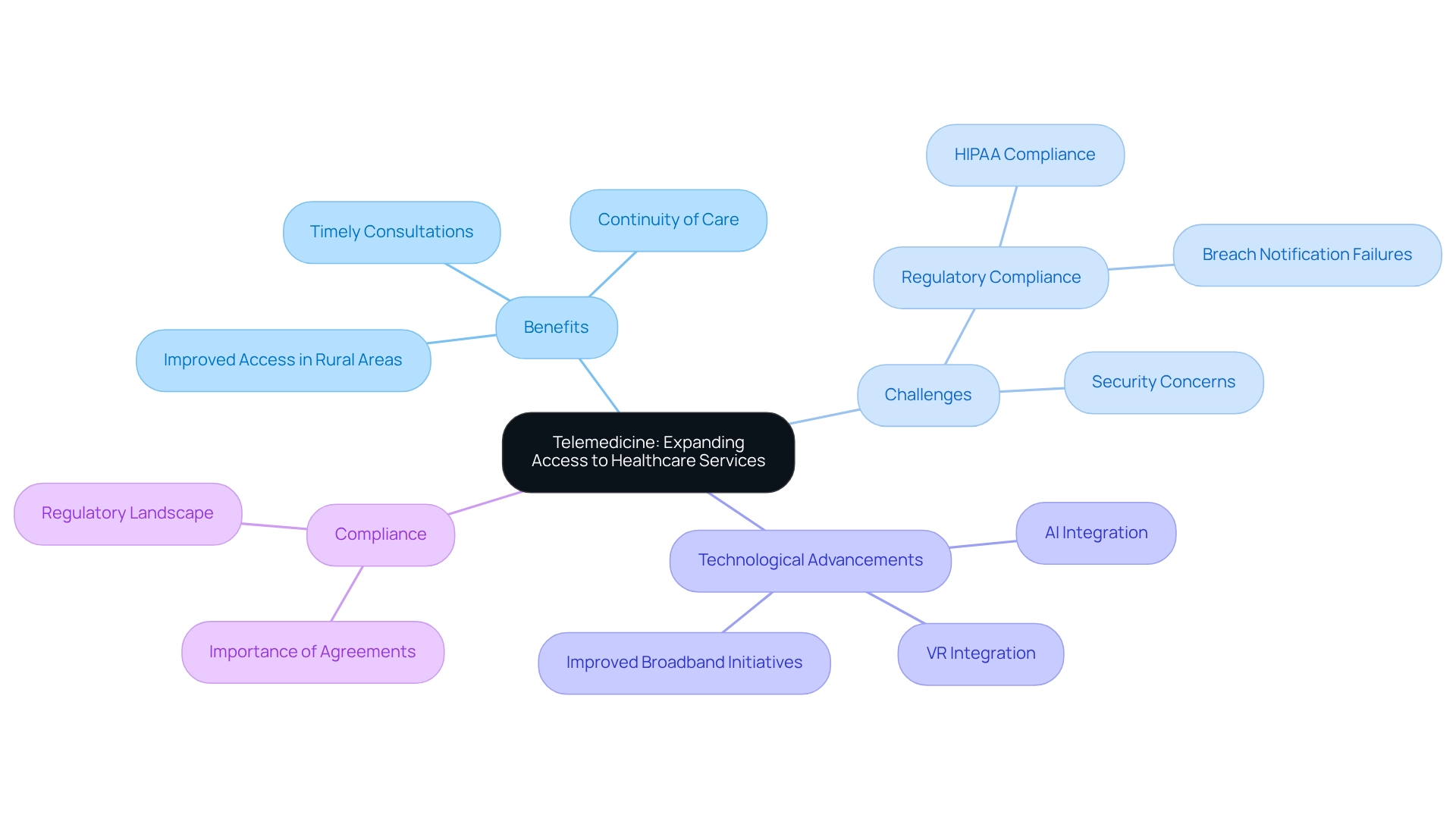
Artificial Intelligence (AI) and Machine Learning: Enhancing Diagnostic Accuracy
Artificial Intelligence (AI) and machine learning are at the forefront of transforming diagnostic procedures in healthcare, markedly enhancing the accuracy and efficiency of care. These advanced tools leverage extensive datasets to identify patterns and predict outcomes, which is vital for improving diagnostic accuracy. For instance, AI algorithms are increasingly employed to analyze medical images, such as X-rays and MRIs, facilitating the detection of anomalies that may escape human observation.
This capability is particularly significant, as studies indicate that AI can improve diagnostic precision by as much as 20%, underscoring its potential impact on health outcomes.
Furthermore, AI contributes to the development of personalized treatment plans tailored to individual data, leading to more effective and targeted care strategies. The integration of AI into medical services not only enhances diagnostic precision but also streamlines clinical processes, allowing healthcare professionals to dedicate more time to direct patient care. Innovative advancements, such as touchless sensors and intelligent speakers, are also being designed for remote health monitoring, further exemplifying the creative applications of AI in the medical field.
Avato’s secure hybrid integration platform plays a pivotal role in facilitating these innovations, ensuring that diverse components can function cohesively. By maximizing and extending the value of legacy platforms, Avato simplifies complex integrations and significantly reduces costs, which is essential for medical organizations as they navigate digital transformation in healthcare.
A notable case study in this domain is the Ambient and Intelligent Care initiative, which utilizes ambient sensing technologies to monitor individual well-being without the need for physical peripherals. This breakthrough not only enhances care for individuals but also optimizes clinical workflows by enabling continuous monitoring of vital signs.
As the medical sector increasingly adopts AI, industry leaders emphasize its significance in improving outcomes for individuals. For example, Gustavo Estrada, a customer, remarked on how Avato has streamlined complex projects, delivering results within desired timelines and budget constraints, particularly in the realm of AI and machine learning initiatives. This perspective reflects the broader trend of companies actively seeking talent to develop, implement, and manage AI systems, with 9% of psychiatrists believing that AI could provide compassionate support to individuals.
This positions AI as a crucial driver of workforce transformation in medical diagnostics, further humanizing care and enhancing data accessibility.
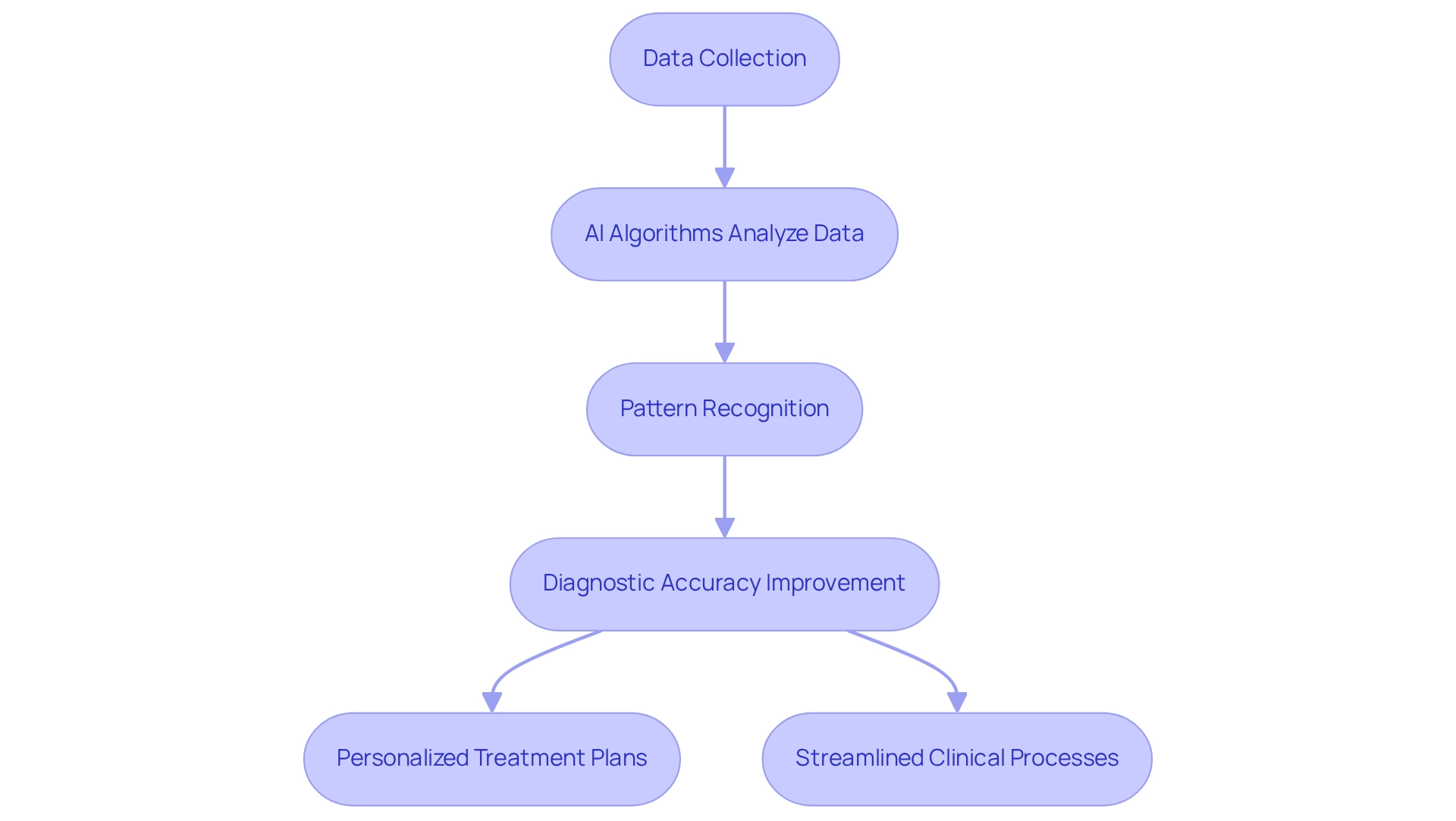
Robotics: Transforming Surgical Procedures and Patient Care
Robotics in healthcare has fundamentally transformed surgical procedures, significantly enhancing precision and minimizing invasiveness. Robotic-assisted surgeries empower surgeons to perform complex procedures with exceptional accuracy, leading to smaller incisions, reduced blood loss, and faster recovery periods for patients. For instance, robotic devices are particularly advantageous in intricate surgeries such as prostatectomies and cardiac procedures, where precision is paramount.
As we look towards 2025, the evolution of robotic surgical advancements continues, showcasing innovations that enhance surgical skills and outcomes. Notably, the integration of AI and virtual reality (VR) into surgical practices is revolutionizing healthcare. AI-powered solutions can analyze extensive data sets to assist surgeons in making informed decisions, while VR technologies provide immersive training environments that refine the skills of medical professionals.
A compelling case study illustrates the challenges faced in robotic surgery, including high costs and the need for specialized training. Addressing these challenges is essential for the effective integration of robotic systems into contemporary medical practice, underscoring the importance of collaboration and innovation.
Moreover, robotics not only improve surgical outcomes but also elevate patient care by automating routine tasks. This automation allows medical professionals to devote more time to direct patient interaction, thereby enhancing the overall experience for those receiving care. Statistics reveal that robotic-assisted surgeries are becoming increasingly common, with a growing number of hospitals adopting these technologies to enhance surgical precision and patient recovery times. Furthermore, advancements in AI and machine learning are paving the way for more autonomous surgical procedures, promising to improve personalized care and outcomes.
However, it is crucial to acknowledge that only 13% of individuals believe AI will enhance the patient-provider relationship, indicating a critical perspective on the integration of AI in medical services. As the medical field continues to embrace these advancements, the impact of robotics on surgical outcomes and recovery times is likely to become even more pronounced, paving the way for a future where surgical procedures are safer and more efficient. Additionally, insights shared at the Interface Summit highlight the importance of data accessibility and ownership in realizing the full potential of these advancements.
Patients must have control over their health data to effectively explore new treatment options. Gustavo Estrada’s viewpoint that Avato can streamline complex projects emphasizes the significance of efficient project management in adopting new advancements, including robotic systems in medical settings, while also stressing the necessity for accessible patient information to fully realize the benefits of these innovations.
3D Printing: Customizing Medical Solutions for Patients
3D printing technology is fundamentally transforming the manufacturing of medical devices and prosthetics by enabling customized solutions that meet individual needs. This innovative method facilitates the development of patient-specific implants, surgical models, and even bioprinted tissues, which are essential for personalized medicine. For instance, 3D-printed prosthetics can be meticulously crafted to align with the unique anatomy of each individual, significantly enhancing both comfort and functionality.
Moreover, the efficiency of 3D printing accelerates the production process for medical devices, resulting in reduced costs and shorter lead times. As of 2025, approximately 60% of medical organizations are utilizing 3D printing methods, indicating a broader trend where 60% of companies employ 3D printing, CAD, simulation, or reverse engineering internally. This capability not only improves care for individuals but also underscores the potential of innovative advancements in transforming healthcare delivery.
In addition to progress in digital healthcare, innovations such as artificial intelligence (AI) and virtual reality (VR) are playing a crucial role in personalizing care. For example, AI-driven solutions can provide customized treatment suggestions, while VR can create immersive environments that assist individuals in managing pain and anxiety during medical procedures. Notably, the use of VR for pain management, as demonstrated at the Interface Summit, illustrates how immersive experiences can significantly reduce pain perception during procedures like needle injections or bandage changes.
These innovations, alongside 3D printing, exemplify digital transformation in healthcare, promoting a more comprehensive approach and ensuring that individual experiences are prioritized.
Recent case studies highlight the effective application of 3D printing in medical device manufacturing, showcasing how hospitals have leveraged this technology to produce tailored prosthetics that meet specific individual needs. However, it is essential to recognize the challenges associated with 3D printing, such as high costs and material availability, as discussed in the case study titled “Challenges in 3D Printing Implementation.” Furthermore, the importance of individual data accessibility and ownership cannot be overlooked; empowering individuals with control over their health information is vital for exploring these innovative treatment options.
These advancements underscore the significant impact of 3D printing on medical device customization, paving the way for future innovations in the field. As the market for 3D printing products and services continues to expand, reaching USD 5.1 billion in 2022, the medical sector stands to benefit immensely from these advancements, ensuring that care for individuals remains at the forefront of technological progress in medicine.
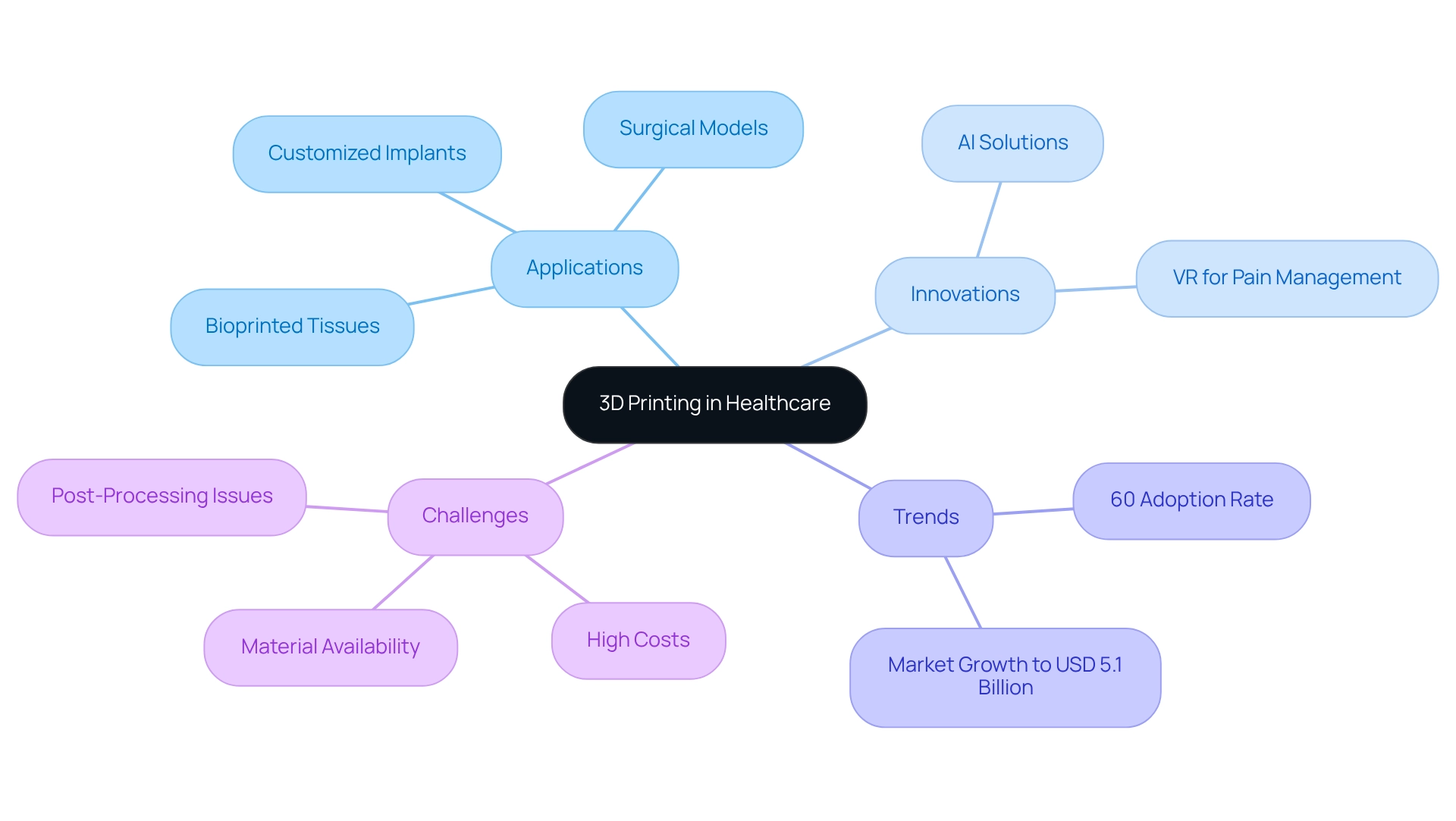
Benefits of Digital Transformation in Healthcare: Improving Outcomes and Efficiency
Numerous examples of digital transformation in healthcare present advantages that significantly enhance outcomes for individuals and improve operational efficiency. A primary benefit is the improved accessibility of data, which enables healthcare providers to make informed decisions swiftly. This transformation streamlines administrative processes, effectively reducing paperwork and minimizing the potential for errors.
Furthermore, digital tools are essential in promoting individual engagement. Telehealth and mobile health applications empower individuals to take an active role in their care, leading to better health management.
Looking ahead to 2025, the emphasis on client involvement through digital resources is expected to rise. Research indicates that organizations adopting these innovations experience substantial improvements in operational efficiency. A recent case study titled “Consumer Demand for Digital Health Interventions” underscores the increasing consumer demand for these solutions, particularly in chronic disease management, highlighting the necessity for robust, evidence-based approaches. As Eddy stated, ‘The intricacy of medicine now surpasses the capability of the human intellect,’ emphasizing the critical need for digital transformation in the medical field.
Healthcare leaders have recognized that leveraging digital resources can yield better outcomes. Statistics reveal that hospitals utilizing these tools report increased patient satisfaction and lower readmission rates. Avato, with its dedicated hybrid integration platform, guarantees 24/7 uptime for critical integrations, underscoring the importance of reliability in digital transformation efforts. This platform is specifically designed for integration projects where downtime is not an option, enabling service providers to balance the speed of integration with the complexity required to future-proof their system stack.
Notably, Avato supports 12 levels of interface maturity, enhancing its ability to adapt to diverse integration needs.
As the complexity of medical services continues to evolve, the integration of digital technologies, as illustrated by examples of digital transformation in healthcare, not only elevates the quality of care but also optimizes resource utilization, ultimately leading to significant cost savings for providers. Moreover, addressing the importance of diversity training in AI development is crucial to mitigate bias and confront inequalities in medical service delivery, ensuring that digital tools are implemented efficiently and equitably.
Challenges of Digital Transformation in Healthcare: Navigating Obstacles
Digital transformation in healthcare presents numerous benefits, yet it is accompanied by significant challenges. One of the most pressing obstacles is the resistance to change among medical professionals, which can impede progress and innovation. A recent study reveals that approximately 70% of medical professionals are hesitant to adopt new technologies, primarily due to concerns about data privacy and security.
This anxiety is exacerbated by the high costs associated with deploying advanced technologies, which can deter organizations from pursuing essential enhancements. Furthermore, interoperability challenges complicate the landscape, as different platforms often struggle to communicate effectively, hindering the seamless transfer of vital information. To address these challenges, medical organizations must adopt a strategic approach that prioritizes stakeholder involvement and robust training programs. Involving leadership in a strategy-driven AI roadmap is crucial, as continuous support from top executives can significantly influence the success of digital initiatives.
Avato’s dedicated hybrid integration platform plays a pivotal role in optimizing integration strategies, enabling medical organizations to streamline diverse frameworks and enhance business value. Successful strategies for overcoming resistance to change include fostering a culture of innovation and collaboration. For instance, Medtronic’s acquisition of Mazor Robotics allowed for the integration of advanced robotic technologies into its surgical offerings, thus improving precision and patient outcomes in minimally invasive surgeries.
By focusing on building trust and demonstrating the tangible benefits of new systems, medical organizations can alleviate concerns and encourage adoption. Moreover, advancements in hardware, such as specialized chips, are driving AI performance, facilitating real-time applications that enhance customer service and operational efficiency, particularly during peak demand periods. With the global workforce projected to encompass approximately 149 million technology-focused positions in the next five years, the urgency for medical organizations to adapt and innovate has never been more critical. Addressing these barriers is essential for unlocking the full potential of digital transformation in healthcare, ensuring that organizations can thrive in an increasingly complex environment.
To effectively engage stakeholders, medical organizations should implement structured engagement strategies that encompass:
- Regular communication
- Feedback loops
- Training sessions tailored to address specific concerns
Additionally, modeling business processes with visual aids can clarify the advantages of new innovations, making it easier for stakeholders to recognize their value. Avato’s commitment to achieving outcomes for clients is evident in its approach to streamlining integration challenges, ensuring that medical organizations can navigate the complexities of digital transformation with confidence.
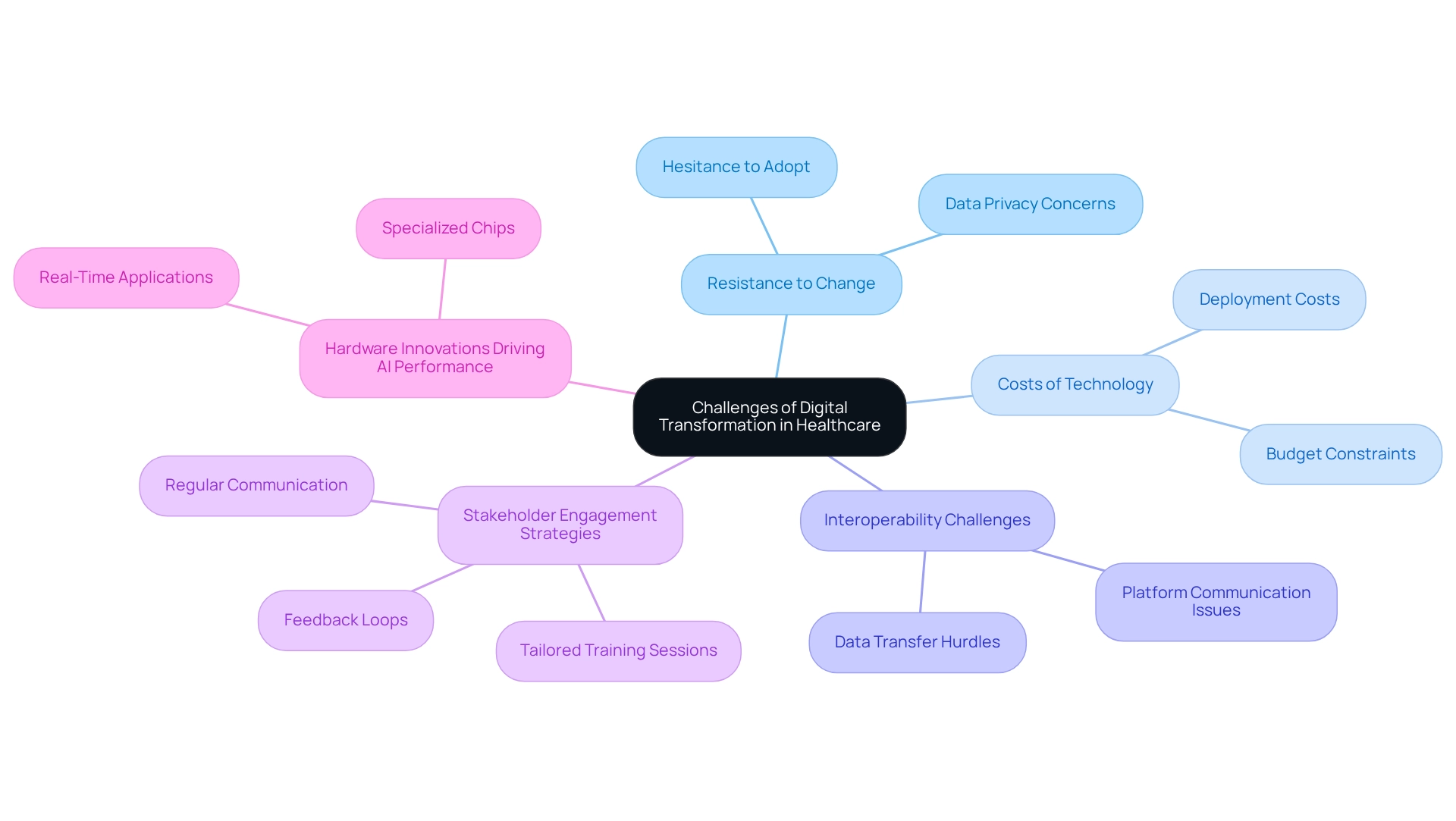
Future Trends in Digital Transformation: What Lies Ahead for Healthcare
The future of digital change in the medical field is poised for significant progress, primarily driven by advancements such as artificial intelligence (AI), blockchain, and the Internet of Things (IoT). AI is expected to dramatically enhance diagnostic capabilities and facilitate personalized medicine, allowing for tailored treatment plans that improve outcomes for individuals. Meanwhile, blockchain technology is emerging as a vital component in bolstering data security and interoperability, ensuring that sensitive individual information is both protected and readily accessible across platforms.
Avato, with its innovative hybrid integration platform, stands at the forefront of this transformation, enabling seamless and secure data connectivity that is essential for modern medical systems. The integration of IoT devices is particularly groundbreaking, allowing for real-time tracking of health metrics. This capability not only promotes proactive care management but also empowers medical providers to respond swiftly to changes in individual conditions.
Consider the effective data transfer from wearable sensors, which is becoming increasingly critical, especially with the rise of faster connectivity solutions like 5G. This surge in data generation demands innovative processing and storage solutions to fully leverage the potential of these devices. Developing energy-efficient data transmission techniques is crucial for the effective utilization of wearable sensors in medical environments.
As these advancements unfold, medical organizations must remain agile and adaptable, ready to seize new opportunities that enhance individual care and operational efficiency. The ongoing digital transformation, exemplified by various instances of digital evolution in healthcare, is set to redefine the medical landscape, steering it toward a more patient-centric and data-driven model. With 189 articles analyzed on this topic, it is clear that the integration of AI, blockchain, and IoT serves as pivotal examples of digital transformation in healthcare, shaping the industry’s future and making it imperative for organizations to invest in these innovations to stay competitive and responsive to patient needs.
As Gustavo Estrada observed, Avato simplifies complex projects and delivers results within desired timelines and budget constraints, underscoring the significance of reliable technology in achieving operational efficiency.
Conclusion
The digital transformation of healthcare represents a fundamental shift, poised to redefine the delivery and experience of care. Technologies such as electronic health records, telemedicine, artificial intelligence, and robotics are not just enhancing patient outcomes; they are improving operational efficiency and expanding access to care. Successful case studies underscore the tangible benefits of these innovations—from the precision of robotic surgeries to the accessibility offered by telemedicine—demonstrating their potential to elevate patient care.
However, the path toward full digital integration is fraught with challenges. Significant hurdles, including resistance to change, interoperability issues, and high implementation costs, must be navigated by healthcare organizations. Engaging stakeholders through effective training and communication is vital to foster a culture of innovation and address concerns around data privacy and security. By leveraging platforms like Avato’s hybrid integration system, organizations can simplify complex integrations, allowing them to focus on delivering enhanced value to patients.
Looking ahead, the potential for advancements in healthcare technologies is immense. The integration of AI, blockchain, and IoT will continue to shape the landscape, enabling personalized care and bolstering data security. As organizations prepare for this evolving environment, prioritizing patient-centric models and data-driven decision-making will be crucial. Committing to these digital transformations will empower healthcare providers not only to meet but to exceed patient expectations, ultimately leading to a healthier and more connected society.

